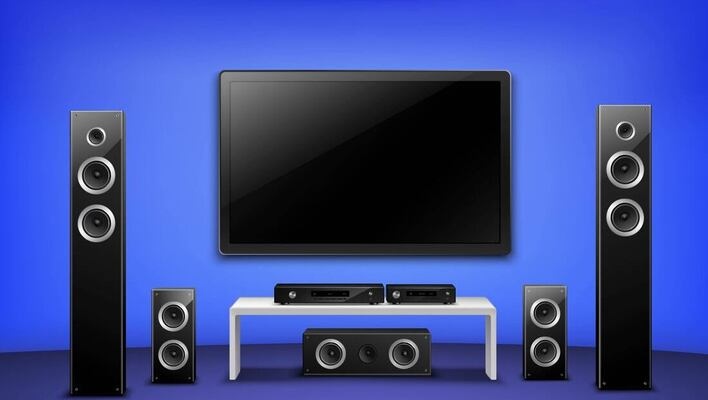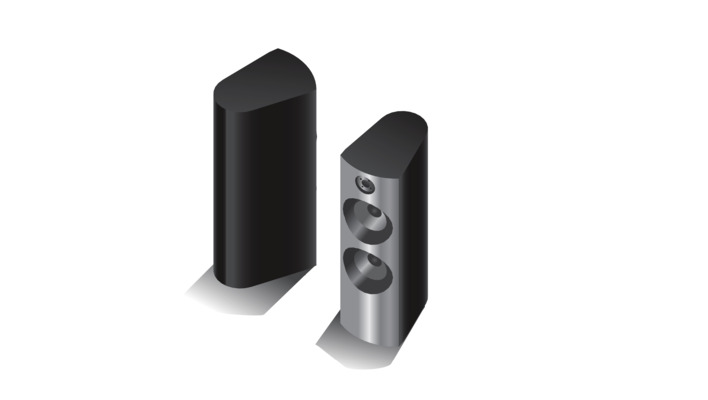The center channel is undoubtedly the most important speaker in the home theater system. This is the channel responsible for the reproduction of all dialogue and any sound associated with actions that seem to take place directly in front of you. As the name suggests, this speaker is designed to be placed at the center of the surround sound system, usually above or below the TV/ projecting screen.
On the other hand, bookshelf speakers are compact loudspeakers that are designed to be used as standalone or as part of an existing home theater system. These speakers are best suited for small to medium-sized rooms but, they can be incorporated into larger surround sound setups.
Typically, bookshelf speakers are designed to rest on an elevated surface, particularly on a shelf or a table, which begs the question; can you use a bookshelf speaker as a center channel speaker? We’ll get to that in a minute.
Before that, it is important to understand the specifics of a center channel speaker and why it is the most important speaker of the home theater system.

Importance of center channel speaker
First off, it is important to note that if your system lacks a center channel, the receiver will send the center channel signal to the left and right channels speakers. While this may work to some extent, the sounds will be mixed up, and there will be no distinction between left, central, or right sounds.
Using a dedicated center channel speaker ensures that each channel focuses on reproducing its part of the sound range. In return, the center channel content is directed to the desired destination.
Another benefit of having a dedicated channel for the center channel sounds is that it lets you control its volume independently.
The center channel creates a localized “sweet spot” that makes it easy for you to enjoy music from any location, but with the sounds still appearing to come from one central location. In addition, it acts as the link between the left and right front speakers in an attempt to provide a perfect balance across the sound spectrum.
Can I Use Bookshelf speaker as a Center Channel Speaker?
In most instances, the answer is ‘no’.
In fact, most sound engineers and audiophiles are against the idea of using a bookshelf speaker or any other speaker/soundbar for the center channel.
Although there is no law or a requirement that prohibits the use of a bookshelf speaker as center channel, it practically impossible considering that both speakers have different functionality. Besides having a vertically-placed center channel speaker looks odd unless it is ultra-compact to fit below your TV without competing with other furniture.
A center channel speaker is designed to sit horizontally on a surface, which is based on the assumption that it needs to fit below or above the TV screen. On the flip side, a regular bookshelf speaker is vertically-oriented, so placing a bookshelf speaker in a horizontal position is generally not recommended.
Ideally, bookshelf speakers are crafted to have a wider vertical sound dispersion so, laying one on its side only works against that design objective. The bass response might also be interfered with if the bass driver is placed too close to the surface than it would be in a vertical alignment.

In addition, the center channel is designed to match the tonal characteristics of the right/left speakers. If you decide to use any other speaker as the center channel, you might start to experience sound disharmony as it moves from one side to the other.
A center channel placement will always have the tweeter at the center facing towards the listener and at ear level. Placing the speaker on its side might move the tweeter off to the side, which might hamper the overall music listening experience. Besides, placing a vertical speaker in front of the TV might also end up blocking the screen since most are way taller to fit inside the cabinet.
But there are still some speakers that can be oriented on the side without impairing the sound quality. Be sure to contact the manufacturer or user manual to determine if the specific speaker can sit on its side.
Some home theater enthusiasts come from the school of thought that advocates for the use of identical speakers for all channels. This means that you can use any speaker, including a bookshelf as center channel. However, such arrangements require a transparent projecting screen so that you place all the speakers behind the screen. But you’ll still need to ensure that the tweeters are placed at ear level.
Using the same speakers for all channels also provides the best opportunity to timbre-match all speakers in the system. That way, you don’t have to worry about mismatching your speakers, which has an equal chance of making or breaking your sound experience. You can still decide to go with a center channel that’s different from the right and left speakers, but the variation should be moderate.
Conclusion
A center channel speaker is designed to reproduce a wide range of sounds, and it plays a crucial role in balancing the soundstage. Most center channels are calibrated to deliver a smooth response in any space. Since center speakers are designed to be placed in the TV cabinet, it is almost impossible to use a bookshelf speaker or any other tower speaker as the center speaker.
If you decide to use a bookshelf speaker for the center channel, just ensure you get a size that can fit inside the TV cabinet. Another option is having the bookshelf rest vertically above your TV or on a speaker stand to help project the tweeters directly towards the listening area. But again, you can avoid all this hassle by getting a dedicated speaker for the center channel.
